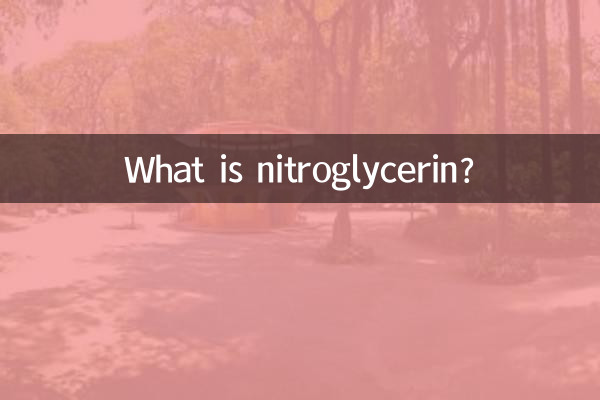What is nitroglycerin?
Nitroglycerin is a drug widely used in the treatment of cardiovascular disease, especially in relieving the symptoms of angina pectoris. In recent years, with the increase in patients with cardiovascular disease, nitroglycerin-related topics have become a hot topic of discussion. This article will introduce in detail the mechanism of action, indications, usage and dosage of nitroglycerin, and precautions, and attach structured data for reference.
1. Basic information about nitroglycerin

Nitroglycerin is an organic nitrate drug that mainly dilates blood vessels to improve blood supply to the myocardium, thereby relieving the symptoms of angina pectoris. It is usually used as a sublingual, spray, or patch.
| Drug name | Nitroglycerin |
|---|---|
| English name | Nitroglycerin |
| chemical formula | C3H5N3O9 |
| Indications | Angina pectoris, myocardial infarction, heart failure |
| Dosing method | Sublingual, spray, patch |
2. The mechanism of action of nitroglycerin
The main function of nitroglycerin is to activate guanylyl cyclase in vascular smooth muscle cells by releasing nitric oxide (NO), leading to an increase in cyclic guanosine monophosphate (cGMP) levels, thereby relaxing vascular smooth muscles and dilating blood vessels. This effect can reduce the load on the heart and improve the blood supply to the myocardium.
| Mechanism of action | Effect |
|---|---|
| Releases nitric oxide (NO) | Activate guanylyl cyclase |
| Improve cGMP levels | Vascular smooth muscle relaxation |
| dilate blood vessels | Reduce heart load |
3. Indications, usage and dosage of nitroglycerin
Nitroglycerin is mainly used to treat and prevent angina pectoris attacks, and can also be used as an auxiliary treatment for acute myocardial infarction and heart failure. The usage and dosage of different dosage forms are different. The following is the usage and dosage reference of common dosage forms:
| Dosage form | Usage and dosage |
|---|---|
| sublingual tablets | 0.3-0.6mg each time, repeat after 5 minutes if necessary |
| spray | 1-2 sprays each time, repeat after 5 minutes if necessary |
| patch | Once a day, stick it on the chest or upper arm |
4. Precautions for nitroglycerin
Although nitroglycerin is effective, you should pay attention to the following points when using it:
1.Avoid long-term continuous use: Long-term use may lead to drug resistance and reduce drug efficacy.
2.Use with caution in patients with hypotension: Nitroglycerin can significantly lower blood pressure, so patients with hypotension should use it with caution.
3.Avoid taking it with alcohol: Alcohol may enhance the blood pressure-lowering effect of nitroglycerin, causing dizziness or syncope.
4.storage conditions: Nitroglycerin is easily affected by light and heat and becomes ineffective, so it needs to be stored away from light.
5. Side effects of nitroglycerin
Common side effects of nitroglycerin include headache, dizziness, facial flushing, and low blood pressure. Severe cases may cause tachycardia or syncope. If serious side effects occur, stop taking the medicine immediately and seek medical advice.
| Common side effects | serious side effects |
|---|---|
| headache | Tachycardia |
| dizziness | Fainting |
| facial flushing | severe hypotension |
6. Summary
Nitroglycerin, as a classic cardiovascular drug, plays an important role in the treatment of angina pectoris and myocardial ischemia. However, patients must strictly follow medical instructions when using it and pay attention to medication safety and side effects management. I hope that the introduction in this article can help everyone better understand the relevant knowledge of nitroglycerin.

check the details

check the details